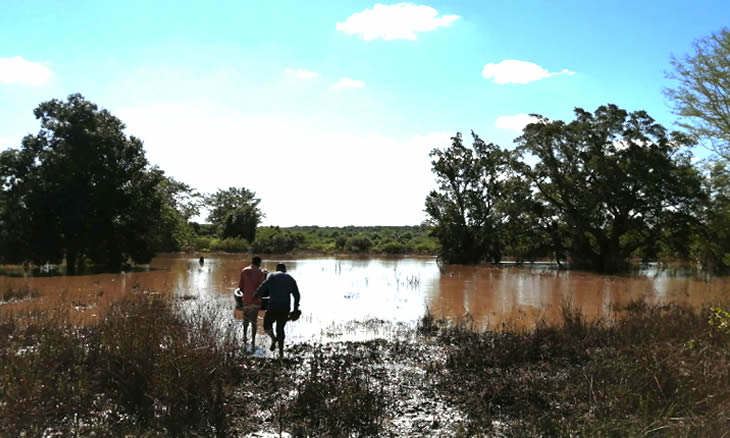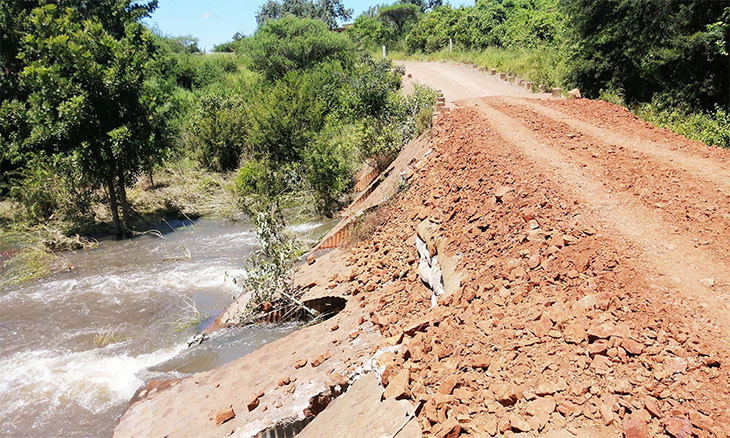Red Notice ivory-smuggling fugitive who had fled to Mozambique arrested by Guangdong ...
Maputo River isolates more than 2,000 as Eswatini opens floodgates

Photo: O Pais
Locals are unanimous: nothing like it has been seen here since 2000. In two weeks, the flow of water in the Maputo River and its tributaries twice exceeded alert levels. In addition to the rain, the drama of isolated villages has been aggravated by the opening of the floodgates in the neighbouring Kingdom of Eswatini.
It is as if they were on an island. On one side is the Maputo River, and on the other an arm of the same watercourse. Four villages in the Catuane administrative post, Matutuine district, Maputo province are under siege.
“We are talking about 2,500 people affected. The big constraint is mobility,” head of the administrative post Nguliche Banda says.
The movement of people and goods to and from the four communities was interrupted by the flooding of a tributary of the Maputo River. The watercourse has its source in neighbouring Eswatini which, two weeks ago, opened dam floodgates to drain water. The quantity of water has increased so much that the tributary [the Catuane River], which had been dry for about four years, now has 10 metres of water in it.
“We have not seen floods like these since [the year] 2000. In recent years, when the floodgates were opened, the water only ended up in the Maputo River. I didn’t reach this area,” says Ernesto Cambale, a native of the village of Zicala and head of the Local Disaster Management Committee.
“It caught everyone by surprise and, as a result, none of the villages managed to get their crops out of the fields, so everything is gone with the water,” our interviewee says.
The affected communities became aware of the opening of the floodgates via Eswatini radio stations, but it took only 24 hours for the water from the kingdom to swallow up the production of the farms on the banks of the Catuane. “As the harvest season had not yet arrived, we could hardly enjoy it.”
People who live in areas that are already difficult to access have found their problems multiplied. To get to Zicala, one of the affected villages, ‘O País’ had to use small, locally manufactured boats. There is already talk of food scarcity in the village.
“Everything is lost. Life’s at a standstill. These days, it’s difficult even to feed the family,” says Mboisse Tembe, a native of Zicala.
In addition to losing all the crops that the family invested in in this agricultural season, the father of four lost part of the kitchen of his home when rains accompanied by strong winds brought down a tree that had been growing in his yard for several years.
Two weeks into the drama, Tembe’s wife talks about food running out. Due to the village’s proximity to neighbouring South Africa, she says, many go there for supplies. But crossing the Maputo River now costs R180.00 – just over 500 meticais.
A few days ago, a vessel even sank. Luckily, no-one died. “A boat-full of people capsized. Baggage, documents and money were lost. We’re thankful that no-one died,” a relieved Judite Matavél says.
Faced with a scenario in which the waters may take two weeks to drain, provided Eswatini does not open the floodgates again, the local government is considering providing food assistance – but only for the elderly.
“We lost about two hectares of crops. We are talking about corn, manioc and cowpeas. This is the great challenge that we are facing,” the head of the administrative post says. “In terms of food, we still do not have clear information. The support that is being improved at the moment is in relation to the elderly.”
Bridge to Catuane repaired
But not everything there is getting worse. Two days after a bridge over the Maputo River in the Mahau region collapsed, isolating more than 5,000 people, an emergency intervention has, since Wednesday, already been allowing people and vehicles to cross again.
A South African company, ‘Três Rios’, which grows and exports lychees and tomatoes from Catuane, devised a provisional solution which consisted of placing stones and sandbags on the structure that had given way.
“The waters are still receding, but some material from the National Road Administration is already on site, so that as soon as circumstances permit, work can begin,” Nguiliche Banda says of the bridge built 26 years ago, itself replacing another bridge which collapsed into the river, also in the1990s.
By António Tiua













Leave a Reply
Be the First to Comment!
You must be logged in to post a comment.
You must be logged in to post a comment.